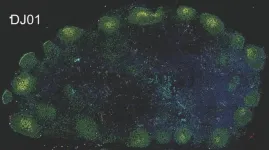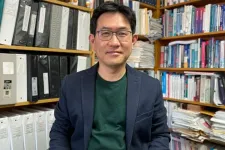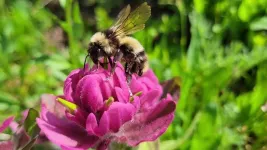(Press-News.org) Women and people of colour remain invisible to many people in Britain and the USA as people pick white men as their heroes instead, a study shows. Their achievements are often forgotten or not recognised when people are choosing who inspires them, researchers have found.
Most people said their family and friends, people closest to them, were their heroes. These ‘everyday’ heroes accounted for one in three choices in Britian and 41 per cent in the US.
In both countries, politicians were popular as heroes, with more common choices including Ronald Reagan, Abraham Lincoln, and Barak Obama, and British Prime Ministers such as Winston Churchill and Margaret Thatcher.
Human rights activists and campaigners were the sixth most popular category in both countries. This included Martin Luther King Jr, whose popularity competes with Nelson Mandela and Malala Yousafzai in the UK, and Mahatma Gandhi and Malcolm X in the US.
But there were striking differences between the two countries. Celebrities, actors, and TV presenters were the second popular category of hero in Britain, with only 1.2 per cent choosing religious figures. Religious figures were the second most popular type of hero in the US, reaching almost 7 per cent of all reported heroes. British respondents tended to choose living religious leaders such as the Pope compared to the US respondents’ affinity with Biblical figures.
British and US women were more likely than men to have women-heroes. American and British men were around four times less likely to have a woman-hero than women - 9 to 34 per cent in the US and 9 to 40 per cent in Britain.
The analysis by Ekaterina Kolpinskaya from the University of Exeter and Nataliya Danilova from the University of Aberdeen is based on YouGov surveys that asked 1,686 adults in Britain and 1,000 in the USA who their biggest personal hero was.
Dr Kolpinskaya said: “The allure of heroes is enduring. We have found people’s gender and ethnicity has an impact on who their hero is. There is a persistent gap between the publicly prominent white male hero-figure and a perpetually ‘invisible’, and ‘forgotten’ heroine. People’s choice of hero reflects their own sex and race and ethnicity.”
Only one in four Britons and one in five Americans said they had a heroine.
When family members were excluded only 11 per cent of Americans choose a women public figure hero, compared to one in five Britons. The under 25’s in the US were more likely to have a women-hero than those who were older while rates for older and younger people were similar in the UK at 25 per cent.
In Britain, supporting the Conservative Party increases the probability of having a woman-hero - 27 per cent chance compared to 13 per cent for Labour, 22 per cent for Liberal Democrats and 14 per cent for UKIP. Researchers believe this represents a ‘Thatcher effect’ – with Margaret Thatcher accounting for 18 per cent of all women-heroes listed by Conservative supporters.
Supporting the Republican Party in the US substantially reduced the chance of having a woman-hero with the Republicans having a 13 per cent chance of having a woman-hero compared to the Democrats’ 25 per cent.
In Britain, although racial prejudice is declining, non-white minority heroes account for only 15 per cent of all heroes compared to 31 per cent in the US. This includes 21 per cent for women. Ethnic minority hero-figures tend to include non-British political activists such as Nelson Mandela, Martin Luther King Jr., Malala Yousafzai, Mahatma Gandhi, and Muhammad Ali, while only three Britons made it to the list, including boxer Lennox Lewis, Formula 1 driver Lewis Hamilton and a Victoria Cross recipient Johnson Beharry. The study says there is an acute need for the public recognition of ethnic minorities in the fabric of British society.
Dr Danilova said: “In both countries, ethnic minorities belong to another group of ‘invisible’, and often overlooked heroes. But there was a much wider presence of non-white Americans in the ‘pool’ of the US heroes. This included prominent public figures such as Barack Obama and Martin Luther King Jr.
“As in Britain, American women are disproportionately – and statistically significantly – more likely to have ethnic minority heroes with one in three women declaring an ethnic minority figures among their family and friends.”
African Americans (88 per cent), Hispanics (70 per cent) and Americans belonging to other ethnic minority groups (89 per cent) had a strikingly higher probability of having a non-white hero compared to white Americans (6.5 per cent).
END
Women and people of color remain “invisible” as most people pick white men as their heroes, study shows
2024-01-24
ELSE PRESS RELEASES FROM THIS DATE:
Texas Biomed researchers pinpoint most likely source of HIV rebound infection
2024-01-24
In findings that have implications for potential new HIV therapies, researchers from Texas Biomedical Research Institute (Texas Biomed) used genetic sequencing techniques on the nonhuman primate version of the virus to identify that lymph nodes in the abdomen are the leading source of rebound infection after the first week of stopping antiretroviral treatment.
The study regarding simian immunodeficiency virus (SIV) was reported in the journal Science Translational Medicine. SIV is very closely related to HIV and is commonly used as a proxy to study HIV in animal models.
“Lymphoid tissues are known to be large ...
Microplastics may be accumulating rapidly in endangered Galápagos penguins’ food web
2024-01-24
Microplastics, with a size from 1 micron to < 5 millimeters, are pervasive pollutants that have been found in all parts of the global ocean, and have made their way into the marine food webs. Researchers, led by University of British Columbia UBC’s Institute for the Oceans and Fisheries scientists and Ecuadorian researchers from Galápagos and the ESPOL Polytechnic School (Guayaquil, Ecuador), looked closely at how microplastic bioaccumulation was affecting the endangered Galápagos penguin (Spheniscus mendiculus) as an indicator species to trace how deeply microplastic bioaccumulation has entered the food web in the isolated Galápagos Islands.
An ...
The more the merrier: Research shows online interventions with social support help middle-aged adults with obesity lose weight
2024-01-24
Obesity is a problem in the United States. In fact, 42.5% of U.S. adults aged 20 and over have the disease. Not only is obesity the nation’s second leading cause of preventable death (behind only smoking cigarettes), it also leads to other serious health issues, including an increased risk of type 2 diabetes, high blood pressure, heart disease, stroke, cancer, sleep apnea and liver disease. The disease and its side effects impose a significant financial burden on America’s health care system.
As many make — and often fail to keep — New Year’s resolutions about exercise and weight loss goals, University ...
Salk Institute Professor Ronald Evans honored with Japan Prize
2024-01-24
LA JOLLA (January 22, 2024)—Salk Professor Ronald Evans has been named the 2024 recipient of the Japan Prize in the field of Medical Science and Pharmaceutical Science. The Japan Prize Foundation awards this prestigious international award annually to “express Japan’s gratitude to international society.”
"I am delighted to extend my congratulations to Ron for this well-deserved recognition in honor of his discovery of nuclear hormone receptors,” says Salk President Gerald Joyce. “This accomplishment not only reflects the exceptional caliber of Ron’s research ...
How does HIV get into the cell’s centre to kickstart infection?
2024-01-24
UNSW medical researcher Dr David Jacques and his team have discovered how the human immunodeficiency virus (HIV) breaches the cell nucleus to establish infection, a finding that has implications beyond HIV biology.
To infect cells, HIV must enter the target cell and make its way to the nucleus in the cell’s centre where enough copies of its genetic code can be produced to infect other cells.
To safely complete this quest, the virus builds a protective protein coat – a capsid – to shield itself from the host’s immune defences geared to destroy it. Until ...
One in five Colorado bumblebees are endangered, new report says
2024-01-24
On a cliffside at Mesa Verde National Park in southern Colorado, a fuzzy bee was industriously gnawing at the red sandstone. Making a loud grinding sound, the insect used its powerful jaws to drill tunnels and holes in rocks, where it would build a nest for raising offspring.
The bee, known as Anthophora pueblo, is a type of digger bee native to Colorado. Discovered less than a decade ago, the bee has quickly become Adrian Carper’s favorite pollinator.
“This is just one example of how crazily diverse our native bees are,” said Carper, an ...
Mayo Clinic study explores heart failure, uncovers gene’s role in recovery
2024-01-24
Mayo Clinic researchers studying the genetics of people who had recently developed dilated cardiomyopathy, one of the most common causes of heart failure, have found a particular gene to target for developing future drug therapy treatments. The disease makes it harder for the heart's left ventricle to pump blood effectively to the rest of the body. In this first genome-wide association study, the researchers sought to understand why some patients get better after developing the condition — and some don't.
"We found genetic variation in the CDCP1 gene, a gene that no one has heard of in ...
How studying defensive bacteria may help human gut health
2024-01-24
MSU has a satellite uplink/LTN TV studio and Comrex line for radio interviews upon request.
Images
EAST LANSING, Mich. – Thousands of types of bacteria live in the human gut. They help digest the food we eat and absorb nutrients, but these bacteria don’t just do this to be kind to humans, there is a benefit for them too.
Elizabeth Heath-Heckman, an assistant professor in the College of Natural Science, has received a five-year National Institutes of Health grant from the National Institute for General Medical Sciences totaling $1.9 million to support her research studying ...
Study: This protein may be the ‘glue’ that helps COVID virus stick
2024-01-24
When SARS-CoV-2 enters the human body, the virus’ spike protein binds to a cell, allowing the virus to infiltrate and begin replicating.
A new study from Tulane University, conducted in partnership with Florida International University and published in Protein Science, has identified a protein that may be the glue that helps COVID’s spike protein stick.
The study found that a small piece of a proteoglycan called perlecan LG3 – a protein most commonly found in blood vessels and the brain – ...
Can we predict when a migraine attack will occur?
2024-01-24
EMBARGOED FOR RELEASE UNTIL 4 P.M. ET, WEDNESDAY, JANUARY 24, 2024
MINNEAPOLIS – Migraine is often underdiagnosed and untreated, and even when it is treated, it can be difficult to treat early enough as well as find strategies to prevent attacks. A new study looks at ways to more accurately predict when a migraine will occur—through the use of mobile apps to track sleep, energy, emotions and stress—to enhance the ability to prevent attacks. The study is published in the January 24, 2024, online issue of Neurology®, the medical journal of ...




